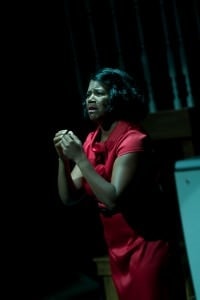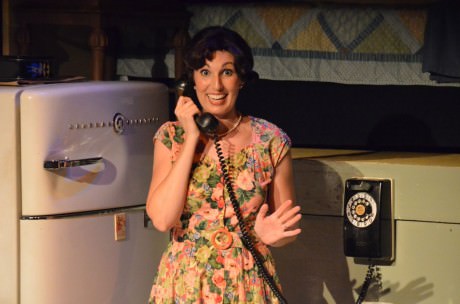Caroline, or Change—the gorgeously resonant musical about race relations and resilience—has just opened in a gloriously heart-rending production by The Elden Street Players. Here in Herndon, Virginia, tucked into an intimate black box theater, is a show with such a superb cast and orchestra, performing with such emotional authenticity and theatrical authority, that it left me after in a kind of rapture: I wanted the honesty of its truth-telling never to end.

The story, which is entirely sung—to a sumptuous score by Jeanine Tesori—is set in 1963 in Lake Charles, Louisiana, where a black maid named Caroline (Anya Randall Nebel, in a stunning star turn) works for a liberal Jewish couple. In the family is a quirky, inquisitive boy named Noah (the supertalented Aiden White*), who wants to befriend her—not out of white liberal guilt exactly but more because he idolizes her. Also because he is grieving his deceased mother. Also because he is irritated by his meddlesome stepmom (Shaina L. Murphy, whose clarion vocals make us warm to her as Noah cannot). Also because he feels distanced from his aloof dad (Matthew Scarborough, (who not only has pipes but plays astoundingly on the clarinet).
Noah thinks the world of Caroline. The feeling is not mutual.
Caroline, or Change is loosely based on the childhood of Tony Kushner, who wrote the book and lyrics and also grew up in a Jewish family in Lake Charles, Louisiana, also minded by a beloved black maid. The acclaimed author of Angels in America and the screenplay for Lincoln, Kushner has written nothing else as openly autobiographical for the stage. In the honesty and clarity with which he conveys and animates his characters’ lives, he holds back nothing. Nor does the Elden Street Players cast. Their soaring voices hit us in the gut and crack open our hearts, over and over.
We first meet Caroline doing the laundry in the basement—and immediately we sense her enormous sorrow. Though put-upon and stuck in this poorly paid position, Caroline is frightened of change, both inside and out. She fears reprisals for speaking up for herself. She fears the activist movement for black civil rights, which could destabilize her tenuous lot in life.

If the setup of Caroline, or Change sounds familiar, you may be remembering The Help, a best-selling novel and subsequent hit film that came out a decade after Caroline started workshops in 1999. Both works had their origin in the viewpoint of a white character based on a white author’s real life. So it is only right that both works be judged on how faithfully and fairly they portray their black characters. My own intimation last night was that the Elden Street Players company had brought so much of their own emotional truth to the words and music—really, it was breathtaking—that Kushner’s and Tesori’s whiteness virtually vanished: a transcendence and epiphany of empathy that may only truly ever happen in live theater.
Being live theater, of course, Caroline, or Change can take artistic liberties, including use of inventive stage devices. In Scene One, our protagonist laundress gets a mini–Greek chorus in the form of a singing Washing Machine (Rikki Howie), a singing Dryer (Malcolm Lee), and a Supremes-like trio that harmonizes as The Radio (Ivana Alexander, Andrea Gerald, and Ariana Kruszewski). On paper these gimmicks are thisclose to insipid, but as embodied by these fine singers, they profoundly deepen our concern and compassion for Caroline.
The smartly functional (uncredited) set design, along with eloquent, evocative lighting (designed by Jeff Boatright), adroitly anchors multiple playing spaces: the basement, the family kitchen, Noah’s bedroom, and an elevated, picket-fenced platform upon which appears, yes, a singing Moon (Rosemarie Stephens-Booker). There’s also a bus stop where Caroline waits for a ride with her feisty friend Dotty, also a maid but more ready to rise up (Brenda Parker, whose spunk is a delight). And, of course, there comes along a singing Bus (Jared Shamberger). Like the chorus of appliances, these roles, wonderfully sung as if antiphonally to Caroline’s, serve further to let us into the life of a touchingly complex main character who, in her constant sorrow and seeming stasis, might otherwise feel remote.
Any residual reserve we might feel about Caroline just dissolves, however, when we meet her three adorable kids and see how abundantly she loves them: the older daughter, Emmie (Caelyn D. Sommerville, another supertalent to watch out for); her younger daughter Jackie (sweetly shy Mareike Elizabeth Nebel), and her youngest, son Joe (scene stealer Royal Tré Jones, III), whose nappy pate at one point Caroline tenderly kisses—and suddenly it’s as if we’ve seen through to her soul.
But in truth we ain’t seen nothin’ yet. Not till near the end of Act Two do we fully feel the gale force of Caroline in all her rage and supplication. It happens in a musical number the program calls “Lot’s Wife.” Brace yourself. As performed by Anya Randall Nebel, it’s a powerhouse, a knock-your-socks-off triumph, an elemental immersion in a character’s anguish the likes of which I’ve not witnessed on any stage anywhere.

There are dozens of factors in this production that flowed into the rapture I felt at the end. But if there’s one that stands out, it’s the dimension of emotional honesty that was shared and sustained throughout the show—in each detail of every performance. This went way beyond superlative ensemble work; this was a company attuned in unison to a fundamental frequency or wavelength that lies way beneath, or far above, just about anything on offer in theater today. As a result the reception in that black box in Herndon was like a hotspot for emotional connection.
I’m told that during the show’s initial runs in New York City, despite critical raves, some early audiences found Caroline to be a more inwardly reflective character than they were used to seeing at the center of a Broadway musical. And of course, up against razzmatazz attention-getters that typically do boffo box office biz, the character of Caroline calls upon a deeper place in us. We cannot in coldness say, “Go ahead, entertain me.” We need to come to know her heart through our own.
This Elden Street production—as sensitively directed by Evan Hoffmann with magnificent musical direction by J. Michael d’Haviland and Elisa Rosman—offers assurance to each of us…that our hearts will not open in vain.
* The role of Noah is shared by Aidan White and John Ray (whose performance I did not see).
Running Time: Two and a half hours, including one intermission.
Caroline, or Change plays through August 24, 2013 at The Elden Street Players at The Industrial Arts Theatre – 269 Sunset Park Drive, in Hendon, VA. For tickets, call the box office at (703) 481-5930, or purchase them online.




